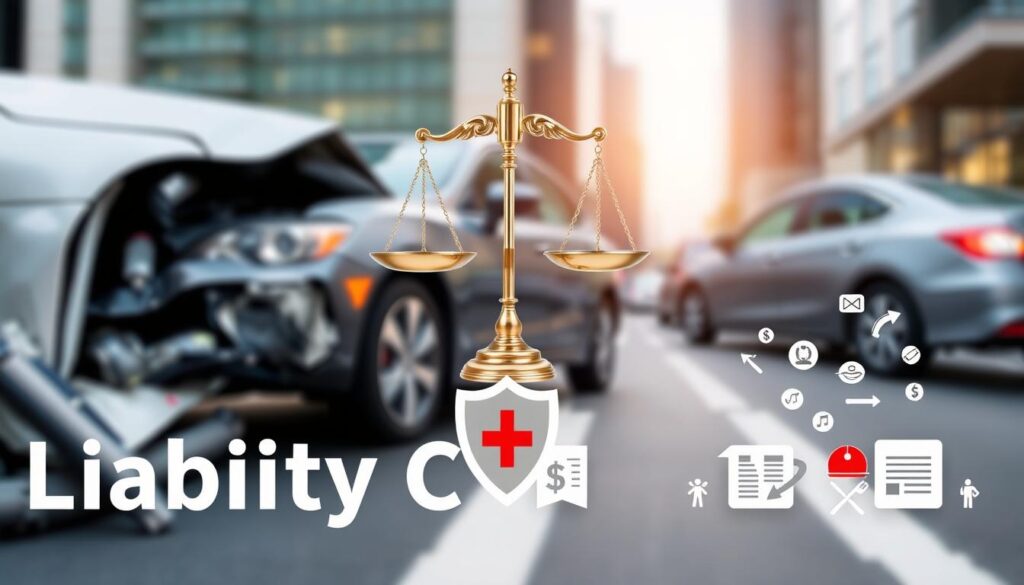Did you know nearly one in eight drivers in the U.S. is uninsured? This is a big reason why full coverage car insurance is so important. It helps protect you financially if you’re in an accident, no matter who’s to blame. Full coverage car insurance offers more than the minimum legal requirements, giving you a safety net for unexpected situations.
This article will dive into the parts of full coverage car insurance and extra options. We’ll also look at what to think about when picking the right policy for you. Knowing about full coverage can help you choose the best protection for your needs on the road.
Key Takeaways (full coverage car insurance)
- Full coverage car insurance provides comprehensive protection beyond the minimum legal requirements.
- It typically includes liability, collision, and comprehensive coverage to protect you financially in the event of an accident.
- Additional coverage options like uninsured motorist, personal injury protection, and gap insurance can further enhance your protection.
- Evaluating your needs, risks, and comparing costs and deductibles are important factors when selecting a full coverage car insurance policy.
- Understanding the different components of full coverage can help you make an informed decision to ensure you have the right level of protection.
Understanding Full Coverage Car Insurance
Many people talk about “full coverage” car insurance, but what does it mean? Full coverage combines comprehensive coverage and collision coverage. These two parts work together to protect your car from many risks.
Comprehensive Coverage Explained
Comprehensive coverage protects your car from non-collision damages. This includes theft, vandalism, natural disasters, and animal collisions. If your car gets damaged, this coverage helps pay for repairs or a new car.
Collision Coverage Breakdown
Collision coverage covers damages if you hit something. This could be a tree, a guardrail, or another car. It’s important to have this coverage to avoid expensive repairs if you’re at fault.
Together, comprehensive coverage and collision coverage make up full coverage car insurance. They offer peace of mind by protecting your car from accidents and unexpected events.
Additional Coverage Options
When you think about full coverage car insurance, it’s key to know about extra coverage options. These options go beyond the basic comprehensive and collision coverage. They offer extra protection in certain situations and make driving safer.
Liability Coverage for Bodily Injury and Property Damage
Liability coverage is a vital part of full coverage car insurance. It covers the costs if you’re at fault in an accident. This includes medical bills for the other driver and their passengers, and damage to their vehicle.
Most states require liability coverage. But, it’s wise to get higher limits. This ensures you’re well-protected in case of a serious crash.
- Liability coverage helps pay for the other driver’s expenses if you are at fault in an accident.
- Uninsured motorist coverage protects you if you are hit by a driver without insurance.
- Personal injury protection covers medical expenses for you and your passengers, regardless of fault.
There are more optional coverages to consider. These include uninsured motorist coverage, personal injury protection, rental reimbursement, roadside assistance, and gap insurance. These options can help cover various expenses and offer a strong safety net for you and your vehicle.

Full Coverage Car Insurance: Factors to Consider (full coverage car insurance)
Choosing a full coverage car insurance policy requires careful thought. Think about your vehicle’s value, your driving history, and how much coverage you need. This helps find the right balance of protection and cost.
Evaluating Your Needs and Risks
Start by looking at your personal situation. Consider your vehicle’s age and condition, your driving habits, and any past claims. This helps you choose the right coverage for your needs and budget.
Cost Comparison and Deductibles
After figuring out what coverage you need, compare different policies. Some may offer new car replacement, which is great if your car is totaled. Look at the costs, deductibles, and coverage value to make a smart choice.